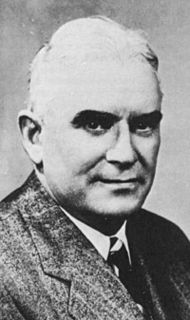The British Columbia Liberal Party is a centre-right provincial political party in British Columbia, Canada. The base of the BC Liberal Party is made up of supporters of both the federal Liberal Party and Conservative Party, and its policies are a mixture of Liberal and Conservative. The party forms the Official Opposition. Andrew Wilkinson became leader of the party on February 3, 2018, after winning the Leadership Election on the fifth ballot, making him the Leader of the Official Opposition of British Columbia.
The New Democratic Party of British Columbia is a social-democratic provincial political party in British Columbia, Canada, which currently governs the province, and previously governed from 1972 to 1975, and then again from 1991 to 2001. Following the 2017 provincial election in British Columbia, the party formed a minority government via a confidence and supply agreement with the British Columbia Green Party, following the defeat of Christy Clark's British Columbia Liberal Party government by a confidence vote in the legislature.
William Andrew Cecil Bennett was a Canadian politician. He was the 25th Premier of British Columbia. With just over 20 years in office, Bennett was and remains the longest-serving premier in British Columbia history. He was usually referred to as W.A.C. Bennett, although some referred to him either affectionately or mockingly as "Wacky" Bennett. To his close friends, he was known as "Cece".

The British Columbia Social Credit Party, whose members are known as Socreds, was the governing political party of British Columbia, Canada, for all but three years between the 1952 provincial election and the 1991 election. For four decades, the party dominated the British Columbian political scene, with the only break occurring between the 1972 and 1975 elections when the New Democratic Party of British Columbia was in power.
The Canadian social credit movement is a Canadian political movement originally based on the Social Credit theory of Major C. H. Douglas. Its supporters were colloquially known as Socreds in English and créditistes in French. It gained popularity and its own political party in the 1930s, as a result of the Great Depression.

The British Columbia Unity Party was a political party in British Columbia, Canada. The party was founded as an attempted union of five conservative parties: the Reform Party of British Columbia, the British Columbia Social Credit Party, the British Columbia Conservative Party, the British Columbia Party, and the Family Coalition Party of British Columbia. Members from the first four parties joined with the Family Coalition Party to refound the Family Coalition Party as the BC Unity Party on January 10, 2001. The party was formed to present a united conservative option to voters in opposition to the centre-right BC Liberals and the centre-left New Democratic Party (NDP).
The Alberta Social Credit Party was a provincial political party in Alberta, Canada, that was founded on social credit monetary policy put forward by Clifford Hugh Douglas and on conservative Christian social values. The Canadian social credit movement was largely an out-growth of the Alberta Social Credit Party. The Social Credit Party of Canada was strongest in Alberta, before developing a base in Quebec when Réal Caouette agreed to merge his Ralliement créditiste movement into the federal party. The British Columbia Social Credit Party formed the government for many years in neighbouring British Columbia, although this was effectively a coalition of centre-right forces in the province that had no interest in social credit monetary policies.

The Social Credit Party of Canada, colloquially known as the Socreds, was a conservative-populist political party in Canada that promoted social credit theories of monetary reform. It was the federal wing of the Canadian social credit movement.
The British Columbia Conservative Party, formerly the British Columbia Progressive Conservative Party, is a provincial political party in British Columbia, Canada. From the early 1900s until the 1950s, the Conservatives were, along with the British Columbia Liberal Party, one of the two major parties in the province. Since the 1950s, the party has gradually declined in prominence, last winning a seat in a 1978 by-election. The Conservatives enjoyed a brief resurgence after Liberal MLA John van Dongen joined the party in 2012, and won nearly 5% of the vote in the 2013 provincial election. The party plays a minor role in provincial politics today.
The British Columbia Party is a right-wing political party in the Canadian province of British Columbia, founded in 1998 as a populist party by John Motiuk, a North Vancouver lawyer.

The Reform Party of British Columbia is a populist right wing political party in British Columbia, Canada. Although its name is similar to the defunct Reform Party of Canada, the provincial party was founded before the federal party was and it did not have any formal association with it. Their peak of support came in 1996 when they elected two members to the Legislative Assembly of British Columbia.

The British Columbia general election of 2001 was the 37th provincial election in the Province of British Columbia, Canada. It was held to elect members of the Legislative Assembly of British Columbia. The election was called on April 18, 2001, and held on May 16, 2001. Voter turnout was 55.4 per cent of all eligible voters.

The British Columbia general election of 1996 was the thirty sixth provincial election in the Province of British Columbia, Canada. It was held to elect members of the Legislative Assembly of British Columbia. The election was called on April 30, 1996, and held on May 28, 1996. Voter turnout was 59.1 per cent of all eligible voters. The election is notable for producing a "false-winner" outcome, rewarding a party that got second in the popular vote with a majority government.

Democratic Reform British Columbia was a progressive–centrist political party in the Province of British Columbia, Canada.
The British Columbia general election of 1975 was the 31st general election in the Province of British Columbia, Canada. It was held to elect members of the Legislative Assembly of British Columbia. The election was called on November 3, 1975, and held on December 11, 1975. The new legislature met for the first time on March 17, 1976.

The 1952 British Columbia general election was the 23rd general election in the Province of British Columbia, Canada. It was held to elect members of the Legislative Assembly of British Columbia, alongside a plebiscite on daylight saving time and liquor. The election was called on April 10, 1952, and held on June 12, 1952. The new legislature met for the first time on February 3, 1953. It was the first general election to use a preferential ballot, a short-lived phenomenon in BC. The presence of multi-member districts such as Victoria City with 3 MLAs in conjunction with the Alternative voting system called for an innovation where the district's slate of candidates was split into three "ballots," each with one candidate from each party.
John Sylvester Weisgerber is a Canadian politician and businessman. He is a former member of the Legislative Assembly in British Columbia. During his political career he was briefly the leader of the British Columbia Social Credit Party and the Reform Party of British Columbia. After leaving politics, he was appointed to the board of BC Hydro in 2001, and serves as a member of the British Columbia Treaty Commission.

Wilf Hanni is a politician and oil industry consultant in British Columbia, Canada. Hanni served as leader of the Reform Party of BC from August 30, 1997 to June 1998, and later as leader of the British Columbia Party, and the BC Conservative Party. He was the leader of the Christian Heritage Party of BC until 2013 when he stepped down due to family health issues..
The Politics of British Columbia involves not only the governance of British Columbia, Canada, and the various political factions that have held or vied for legislative power, but also a number of experiments or attempts at political and electoral reform.
The British Columbia Social Constructive Party was formed in 1936 by a breakaway from the British Columbia Co-operative Commonwealth Federation after Robert Connell was expelled from the party over doctrinal differences. Connell had been leader of the CCF until his expulsion. Three other MLAs of the seven-person CCF caucus, Jack Price, R. B. Swailes, and Ernest Bakewell, left the party and joined Connell to form the Social Constructives. The four member caucus, having one more MLA than the CCF, was large enough to allow Connell to remain Leader of the Opposition in the British Columbia Legislative Assembly. Other defectors included Victor Midgely, former leader of the One Big Union, and Bill Pritchard, editor and owner of the BC CCF's newspaper, The Commonwealth. The party worked closely with Rolf Wallgren Bruhn an independent MLA who had formerly been a Conservative. Bruhn helped write the new party's platform and conducted a speaking tour with Connell during the 1937 general election but declined to join the party and stood for re-election as an independent though with the Constructives' endorsement.











